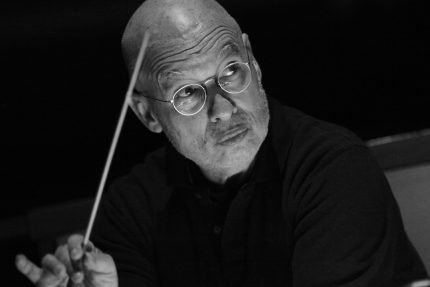Bruckner Orchester Linz offers a populist program at the Harris Theater
Conductor Dennis Russell Davies brought his Bruckner Orchester Linz and vocalists Angélique Kidjo and Martin Achrainer to the Harris Theater Friday night for a program teeming with American and African associations. While the experience was uneven in some respects, it unfolded as an arresting cross-section of competing and complementary styles, composers working within and outside their natural confines, performers extended beyond their comfort zones, and even audience subsets with varying familiarity with the norms of classical music presentation.
Their concert in Carnegie Hall three nights earlier was an all-Philip Glass 80th birthday affair, but apparently presenters felt that naive heartlanders (including an Ann Arbor audience the night before) would be better served with a more populist program. The second performance of Glass’ Symphony No. 11 would have given the Chicago appearance a stronger sense of occasion than did the pops concert standards of Gershwin and Ellington, but at least the Harris audience heard a rare and compelling performance of Alexander Zemlinsky’s underrated Symphonische Gesänge, a treat not afforded the New Yorkers.
By definition languages have a musical component, and composers’ savvy in teasing out their inherent sound and rhythm is a hallmark of effective vocal settings. Glass is something of a connoisseur in this regard, having earlier probed Egyptian, Sanskrit, Garani and Latin for their inherent musical character. Glass’ preparation for the commission of Ifè: Three Yorùbá Songs, included a detailed sonic analysis of the Yorùbá language as heard in the voice of Kidjo.
All cultures have their creation myths, and for the Yorùbá of Southwestern Africa (and the center of the slave trade for the new world) the legend center around Ifè, the birthplace of the universe. Kidjo’s earthy, captivating alto led her listeners through an engaging blend of characters, locales, and dramatic entanglements, all unfolding over the churning of Glass’ minimalist score. In the course of the performance her physical involvement grew increasingly animated, culminating in the spirited praises of the Rainbow Serpent in the bustling third song, “Oshumare.”
She easily won over her many admirers at the event, though given the centrality of the text, supertitles would have been a wise investment. The appreciative audience brought her and Davies back for a reprise of the final minutes of the concluding song. It’s unlikely that repeated hearings will reveal layers of nuance not immediately discernible at first exposure, but their palpable energy and the immediacy of the irresistible story made for an engaging performance.
Composers usually set texts in their original language even it is not their native tongue, so closely intertwined are poetry’s sound and substance. Yet Zemlinsky opted for German translations of seven of Langston Hughes’ poems for his Symphonic Songs.
Just as striking is the composer’s refusal to incorporate jazz or blues into his musical language, especially given American music’s popularity in Europe at the time. Hearing the writings of this master of the Harlem Renaissance in the guise of 1920’s German Expressionism is jarring, to say the least. But the agonized angst so typical of the idiom proves entirely appropriate in the two poems that allude to lynchings in the American south. Zemlinsky’s color palette, ambiguous tonality, and jagged melodic lines invoked the sounds worlds of early Schoenberg and Berg, and there are more than a few striking similarities to the later’s Wozzeck, premiered a few years earlier.
Bass-baritone Martin Achrainer was first rate, his resonant voice and crisp diction powerfully intoning the confessions of domestic violence in “Bad Man” and the agony of a mother pawning her wedding ring to fund the funeral of her dead daughter in “Arabesque.” The orchestra may be a notch or two below Europe’s finest, but in this song cycle Davies and his band were in top form, delivering the most assured and idiomatic reading of the evening. Unfortunately the continuity of the performance was repeatedly shattered by applause between numbers.
It is a given that American orchestras still hold sway over their European counterparts in jazz-tinged classics, a natural consequence of superior numbers of personnel with extensive background in the idiom. The American Davies had clearly coached his players exhaustively in the finer points of the language in Morton Gould’s arrangement of Gershwin’s Porgy and Bess Suite, and Maurice Peress’ version of Duke Ellington’s Suite from Black, Brown, and Beige. Portamentos were perfectly synched in the strings and the rhythm sections appeared well-versed in the subtleties of swing. If the wind players couldn’t quite step up to the foreground with the authoritative swagger of their American counterparts, they threw themselves into the effort with the requisite brio.
Posted in Performances






Posted Feb 04, 2017 at 6:02 pm by Hank
DRD seemed to do all he could to stifle applause but was rebuffed at every turn. I really dont know what this insane compulsion to applaud in American audiences. Most disturbing was applause at some very sensitive moments.
Posted Feb 05, 2017 at 10:09 am by Brandon R Barton
I was there, this is a very fine review and captures my sentiments precisely, thanks for the fine writing!
Posted Feb 10, 2017 at 7:02 pm by Robert
The second performance of Symphony No. 11 took place on February 1 at the University of North Carolina at Chapel Hill. It was stupendous.